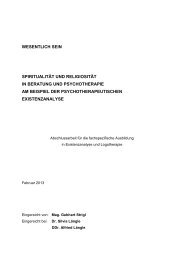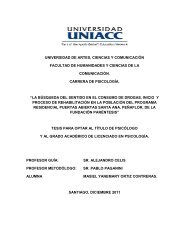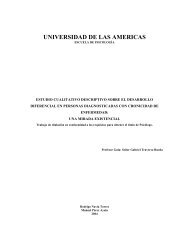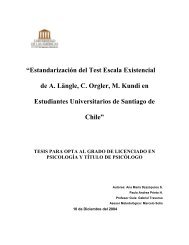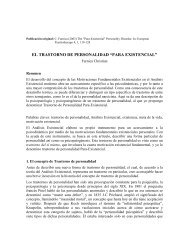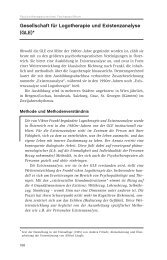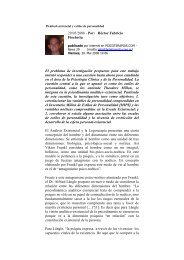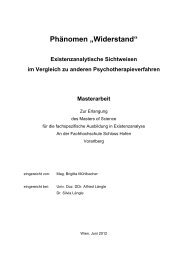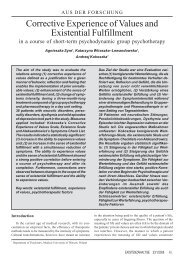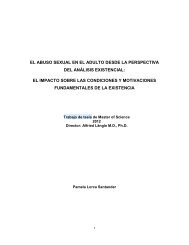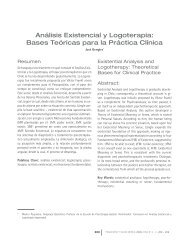The Person-centered Approach from an Existential ... - Home
The Person-centered Approach from an Existential ... - Home
The Person-centered Approach from an Existential ... - Home
You also want an ePaper? Increase the reach of your titles
YUMPU automatically turns print PDFs into web optimized ePapers that Google loves.
Loneliness/existential isolation vs. relationship/’encounter’<br />
In my opinion, this controversial field is well illustrated in<br />
Rogers’ commentary on the case of Ellen West (1961b/1980).<br />
In this case, Rogers arrives at very divergent opinions <strong>an</strong>d<br />
evaluations <strong>from</strong> the Daseins<strong>an</strong>alyst, Ludwig Binsw<strong>an</strong>ger,<br />
who in 1944 had presented the case. While Binsw<strong>an</strong>ger<br />
focused on the tragic fate <strong>an</strong>d existential isolation of the<br />
young wom<strong>an</strong>, who finally committed suicide, Rogers’<br />
comments on the case reveal both his therapeutic optimism<br />
<strong>an</strong>d his deep conviction that the self-alienation <strong>an</strong>d loneliness<br />
of the client could have been kept at bay through healing<br />
care <strong>an</strong>d appropriate underst<strong>an</strong>ding in a nurturing relationship.<br />
For Rogers, ‘existential isolation’ is definitely not <strong>an</strong> ‘existential<br />
given’.<br />
Conclusion<br />
<strong>The</strong> <strong>Person</strong>-Centered <strong>Approach</strong> as a prototype of Hum<strong>an</strong>istic<br />
Psychology, to quote <strong>an</strong>d affirm Yalom’s conclusion,<br />
belongs to the ‘Americ<strong>an</strong> neighbors’ (Yalom 1980) of the<br />
existential approach(es) in psychotherapy. While some essential<br />
elements of existentialism have moved into the<br />
theoretical foundation of the <strong>Person</strong>-Centered <strong>Approach</strong> (i.e.,<br />
phenomenology, recognition of subjectivity, signific<strong>an</strong>ce of<br />
authenticity, encounter, the specific underst<strong>an</strong>ding of<br />
research), some features of the person-<strong>centered</strong> identity (i.e.,<br />
non-directivity, the org<strong>an</strong>ismic valuing process, the concepts<br />
of self <strong>an</strong>d self-actualization) oppose a radical integration of<br />
the existential orientation into the PCA. This applies to Rogers<br />
who, in my view, took up a serious liaison with <strong>an</strong> existential<br />
perspective, but not <strong>an</strong> everlasting marriage, <strong>an</strong>d also to<br />
Gendlin, who equated existential with experiential. Alternatively,<br />
Swildens’ ‘Process-oriented Client-<strong>centered</strong> psychotherapy’<br />
provides <strong>an</strong> existentially based conceptualization<br />
within the <strong>Person</strong>-Centered <strong>Approach</strong> (Swildens 1991; 2002).<br />
All in all, in my view, the impulses that the existential<br />
approach c<strong>an</strong> bring to psychotherapy have not yet been fully<br />
elaborated <strong>an</strong>d discussed in the person-<strong>centered</strong> community<br />
(Cooper 2003b). In this sense, it would be worthwile to<br />
explore the person-<strong>centered</strong> literature beyond Rogers <strong>an</strong>d<br />
Swildens. I’m sorry to say that I could not cover this goal.<br />
Also the reader should forgive me for abstaining <strong>from</strong> quoting<br />
some of the primary existentialist sources.<br />
At the same time, existential therapies c<strong>an</strong> also profit by<br />
valuing, implementing, <strong>an</strong>d applying in practice some person<strong>centered</strong><br />
principles. <strong>The</strong> positive effects of being client<strong>centered</strong>,<br />
in terms of being open to the world as the client<br />
perceives <strong>an</strong>d experiences it, seem obvious to me. <strong>The</strong>se<br />
include the crucial role of empathy in PCA; a clearly nonauthoritari<strong>an</strong><br />
st<strong>an</strong>ce; a view critical of the therapist as <strong>an</strong><br />
expert of client’s matters, while seeing the client as the ultimate<br />
judge relying on their ability to figure out their concerns,<br />
experiences <strong>an</strong>d decisions; <strong>an</strong>d a reservation against methods<br />
<strong>an</strong>d techniques that might interfere with the therapist’s immediate<br />
experience of the client <strong>an</strong>d of the encounter between<br />
the client <strong>an</strong>d the therapist. All these aspects, in my view, are<br />
not taken for gr<strong>an</strong>ted in existential approaches <strong>an</strong>d should<br />
14<br />
EXISTENZANALYSE 25/1/2008<br />
ÜBERSICHTSARTIKEL<br />
therefore be given particular consideration by existential<br />
therapists.<br />
In particular, the dynamic bal<strong>an</strong>ce of polarities that I have<br />
described offers adv<strong>an</strong>tage for both models. Rogers shows<br />
in some respect bal<strong>an</strong>ces: Regarding the free will of hum<strong>an</strong><br />
beings he is a determinist <strong>an</strong>d <strong>an</strong> existentialist. We c<strong>an</strong> see a<br />
similar phenomenon in his underst<strong>an</strong>ding of science, where<br />
he reveals himself as a positivist <strong>an</strong>d phenomenologist, <strong>an</strong>d<br />
in regards to self-actualization, where he is <strong>an</strong> actualist/vitalist<br />
<strong>an</strong>d adherent of encounter theory.<br />
It is up to both orientations to avoid or, at least, to decrease<br />
one-sidedness <strong>an</strong>d to integrate fruitfully such polarities as<br />
freedom <strong>an</strong>d limitations, optimism <strong>an</strong>d pessimism, autonomy<br />
<strong>an</strong>d interdependency, <strong>an</strong> inward-focused openness (selfexperience)<br />
<strong>an</strong>d <strong>an</strong> outward-focused openness (openness to<br />
the world). On the one h<strong>an</strong>d, the therapist acts as <strong>an</strong> empathic<br />
<strong>an</strong>d positive regarding alter ego by trusting in the client’s<br />
actualizing tendency <strong>an</strong>d the org<strong>an</strong>ismic wisdom, <strong>an</strong>d on the<br />
other h<strong>an</strong>d challenges the client by being the other who<br />
enlargens <strong>an</strong>d enriches the client’s horizon through bringing<br />
in their own views <strong>an</strong>d experiences.<br />
References<br />
Anderson R <strong>an</strong>d Cissna, KN (1997) <strong>The</strong> Martin Buber – Carl Rogers<br />
dialogue: A new tr<strong>an</strong>script with commentary. Alb<strong>an</strong>y, NY: State<br />
University of New York Press<br />
Bohart A C (1991) Empathy in Client-<strong>centered</strong> <strong>The</strong>rapy: A contrast<br />
with Psycho<strong>an</strong>alysis <strong>an</strong>d Self-psychology. Journal of Hum<strong>an</strong>istic<br />
Psychology, 31(1), 34-48<br />
Braaten LJ (1961) <strong>The</strong> main themes of „existentialism“ <strong>from</strong> the<br />
viewpoint of a psychotherapist. Mental Hygiene, 45(1), 10-17<br />
Buber M (1923/1958) I <strong>an</strong>d Thou. 2 nd<br />
ed. New York: Charles Scribner’s<br />
Sons<br />
Bugental J (1978) Psychotherapy <strong>an</strong>d process: <strong>The</strong> fundamentals of <strong>an</strong><br />
<strong>Existential</strong>-Hum<strong>an</strong>istic <strong>Approach</strong>. Boston: McGraw-Hill<br />
Cain D (2001) Defining characteristics, history, <strong>an</strong>d evolution of Hum<strong>an</strong>istic<br />
Psychotherapies. In D Cain <strong>an</strong>d J Seem<strong>an</strong> (Eds), Hum<strong>an</strong>istic<br />
Psychotherapies. H<strong>an</strong>dbook of research <strong>an</strong>d practice (3-<br />
54). Washington, DC: Americ<strong>an</strong> Psychological Association<br />
Cooper M (2003a). <strong>Existential</strong> therapies. London: Sage<br />
Cooper M (2003b) Between freedom <strong>an</strong>d despair: <strong>Existential</strong> challenges<br />
<strong>an</strong>d contributions to person-<strong>centered</strong> <strong>an</strong>d experiential therapy.<br />
<strong>Person</strong>-Centered & Experiential Psychotherapies, 2(1), 43-56<br />
Cooper M (2004) <strong>Existential</strong> approaches to therapy. In P S<strong>an</strong>ders<br />
(Ed), <strong>The</strong> tribes of the person-centred nation. An introduction to<br />
the schools of therapy related to the <strong>Person</strong>-centred <strong>Approach</strong><br />
(95-124). Ross-on-Wye: PCCS Books<br />
deCarvalho R (2005) Bugental, James FT In G Stumm, A Pritz, P<br />
Gumhalter, N Nemeskeri <strong>an</strong>d M Voracek (Hrsg), <strong>Person</strong>enlexikon<br />
der Psychotherapie (75-77). Wien-New York: Springer<br />
Fr<strong>an</strong>kl V (1969/1988) <strong>The</strong> will to me<strong>an</strong>ing. Foundations <strong>an</strong>d applications<br />
of logotherapy. Exp<strong>an</strong>ded edition. New York: New<br />
Americ<strong>an</strong> Library<br />
Friedm<strong>an</strong> M (Ed) (1964/1991) <strong>The</strong> worlds of existentialism. A critical<br />
reader. Reprint. Amherst, NY: Hum<strong>an</strong>ity Books<br />
Friedm<strong>an</strong> M (1986) Carl Rogers <strong>an</strong>d Martin Buber. Self-actualization<br />
<strong>an</strong>d dialogue. <strong>Person</strong>-Centered Review, 1(4), 409-435<br />
Gendlin ET (1966) <strong>Existential</strong>ism <strong>an</strong>d Experiential Psychotherapy. In<br />
C Moustakas (Ed), <strong>Existential</strong> child therapy (70-94). New York:<br />
Basic Books<br />
Gendlin ET (1975) Experiential Psychotherapy. In R Corsini (Ed),<br />
Current psychotherapies (317-352). Itasca, IL: Peacock



